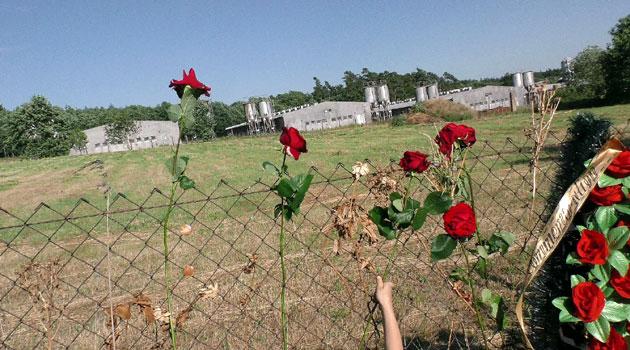Slovakia-based stockholder in pig farm on Romani genocide site suing over sale to Czech Republic - twice

The court has yet to decide on a recent lawsuit filed by a shareholder in the company that owns the pig farm in Lety against its decision to sell the facility to the state, but that hasn’t stopped that same shareholder from filing a separate lawsuit in the matter. Czech daily Mladá fronta DNES reports today that the shareholder in the AGPI firm, which owns the farm, is planning a separate lawsuit against the contract with the state.
Jan Čech of AGPI has told the Czech News Agency that he has no information about the new lawsuit yet and that the previous lawsuit questioning the decision by AGPI’s general meeting to sell the farm has yet to be adjudicated. The state is buying the facility because it is located on the site of what once was a concentration camp for Romani people.
AGPI’s general meeting expressed its agreement in July with the transfer of the farm to the state. The purchase agreement was signed between AGPI and representatives of the state last week for a purchase price, VAT included, of CZK 450 800 000 [EUR 17.7 million].
Both lawsuits are being filed by a minority shareholder in AGPI who is based in Slovakia. “We filed a lawsuit against the general meeting at the District Court in Písek, including a motion for the court to review the relationships inside the firm and among the persons who control it. Now we are suing over the contract not being valid,” the shareholder’s attorney Jan Válek told the daily.
Čech has no information from the state about any lawsuits. “For now it is a plan, he would not have been able to file suit before, [the purchase agreement] was just signed four days ago, it won’t happen that fast,” he told the Czech News Agency.
“[The minority shareholder] has the opportunity to sue, so let him do it. He filed suit alleging that the general meeting in July was invalid, but that has not yet been resolved, there is no judgement yet, and once there is one, the parties can appeal. Any drip today can raise hell and file a criminal complaint,” Čech said.
The minority shareholder, who lives in Bratislava, Slovakia, is alleging that the board of AGPI was not authorized to sign the contract with the state about the sale of farm. He is filing suit alleging that the contract is therefore invalid.
The shareholder’s attorney also said the shareholder was never informed about the next general meeting of AGPI, scheduled for 4 December. Čech, however, refutes that.
“The invitations went to all involved at the same time and in time, three days before the deadline. We sent them to him like we did to all the others. They are detailed, we reviewed them with a renowned [law] office in Prague as to what could be there and whether we could send them on that date. The date we put them into the envelopes was posted to the Internet,” the AGPI representative said.
The firm does not yet know how it will spend the sum it is receiving for the facility. The management has reportedly not addressed the issue yet.
“We want, first and foremost, to pay down some of our loans and the rest? The sale is depriving the firm of production capacity, so I believe it could be used to recreate that. Those are our visions – the question is how the shareholders decide,” Čech said.
The camp at Lety was opened in August 1940 by Protectorate authorities as a disciplinary labor camp. It was first intended for men who were unable to document their source of income.
Persons living a travelling lifestyle were also meant to end up in the camp as well. A similar facility existed in Moravia at Hodonín u Kunštátu.
In January 1942 both camps were changed into internment camps, and in August “Gypsy camps” were established at both locations. From that time until May 1943, a total of 1 308 Romani people passed through the Lety camp, 327 of whom perished there and more than 500 of whom ended up at Auschwitz.
According to Nazi estimates, 90 % of Bohemian Roma were murdered at the time. The pig farm was built during communism beginning in 1972 and houses 13 000 pigs.
During the first phase of construction 10 feed halls were erected, followed by three more in the second phase, distributed over 7.1 hectares. The Museum of Romani Culture will be newly charged with taking care of the grounds of the former camp, according to the purchase agreement.
